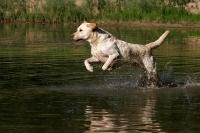A Primer on Leptospirosis
Of all the vaccination questions I receive, the most common one is from folks questioning whether or not to vaccinate their dogs for Leptospirosis. And I am so pleased they are asking- I love when people recognize that simply handing their dog over for “the works” in response to a vaccination reminder card (or these days, perhaps an email reminder) simply doesn’t make sense.
 Unlike canine distemper and parvovirus- infectious bad guys that are ubiquitous in the environment and against which all dogs should receive vaccine protection- not all dogs come into contact with Leptospirosis. Exposure is truly dependent on where you and your dog live and his or her extracurricular activities- in medical jargon this is referred to as “biolifestyle”.
Unlike canine distemper and parvovirus- infectious bad guys that are ubiquitous in the environment and against which all dogs should receive vaccine protection- not all dogs come into contact with Leptospirosis. Exposure is truly dependent on where you and your dog live and his or her extracurricular activities- in medical jargon this is referred to as “biolifestyle”.
Leptospirosis organisms are bacteria that thrive in warmer, wetter climates. Wild animals (particularly deer and rodents) and some domesticated animals (cows, sheep, pigs) can be Leptospirosis carriers. Although infected, they manage to maintain good health while shedding Leptospirosis organisms in their urine. Dogs can develop the disease by coming into contact with the infected urine or urine contaminated soil, water, food, or bedding. So, if your dog’s biolifestyle includes roaming on rural property or drinking from creeks, streams, lakes, or rivers the potential for exposure to Leptospirosis is far greater than if your pup is a couch potato and your yard is devoid of trespassing wildlife.
Not all dogs become sick when exposed to Leptospirosis, but for those that do, the results can be devastating. Symptoms associated with kidney failure (lethargy, vomiting, diarrhea, loss of appetite) are most common. The liver and lungs are also targets for this disease. Your veterinarian will suspect Leptospirosis based on the history your provide, abnormal kidney and/or liver enzymes on blood testing, and specific blood and/or urine testing for Leptospirosis.
Successful treatment ideally consists of aggressive round the clock intravenous fluids and antibiotics. If the kidneys become so inflamed that urine production diminishes, temporary dialysis may be recommended. Infected dogs should be housed in an isolation ward to protect other hospitalized patients and personnel are advised to wear protective garb (gloves, gown, goggles) as Leptospirosis is considered a zoonotic disease (humans can become infected via contact with infected urine). Yes, such therapy is expensive- far more costly than the price of a vaccination- and in spite of everyone’s best efforts, some dogs do succumb to Leptospirosis.
The Leptospirosis vaccine provides adequate protection for one year and, in theory, the risk of adverse reactions is no different than reported with other vaccinations. However, some vets feel strongly that the Lepto vaccine is more likely to produce transient “post-vaccine blues” than are other vaccinations.
Is the Leptospirosis vaccination appropriate for your dog? Talk to your vet to find out whether or not the disease has been reported in your neck of the woods. Next consider your doggie’s biolifestyle. Does your pup live in a pristinely kept environment or does he go camping and hiking with you? If your pup lives in an environment with no standing water or exposure to wildlife, the risks of vaccinating clearly outweigh the benefits. If you and your best buddy love to hike and camp together, vaccinating may be a no-brainer. As I routinely advise whenever discussing vaccines: Administration of vaccinations is no different than any other medical procedure- they should not be administered without individualized discussion and consideration of the potential risks and benefits.
This article is shared with permission from Dr. Nancy Kay, DVM, Diplomate, American College of Veterinary Internal Medicine and author of Speaking for Spot: Be the Advocate Your Dog Needs to Live a Happy, Healthy, Longer Life.
Comments and feedback are welcomed on Dr. Kay's original blog post.
Related Articles
- New Possibilities for Treating Canine Heartworm Disease (10/22/2024)
- The Heart of the Matter: Heartworm Disease in Dogs (04/24/2024)
- Sniffing Out Strategies to Control Chagas Disease (04/18/2023)
Help Future Generations of Dogs
Participate in canine health research by providing samples or by enrolling in a clinical trial. Samples are needed from healthy dogs and dogs affected by specific diseases.



